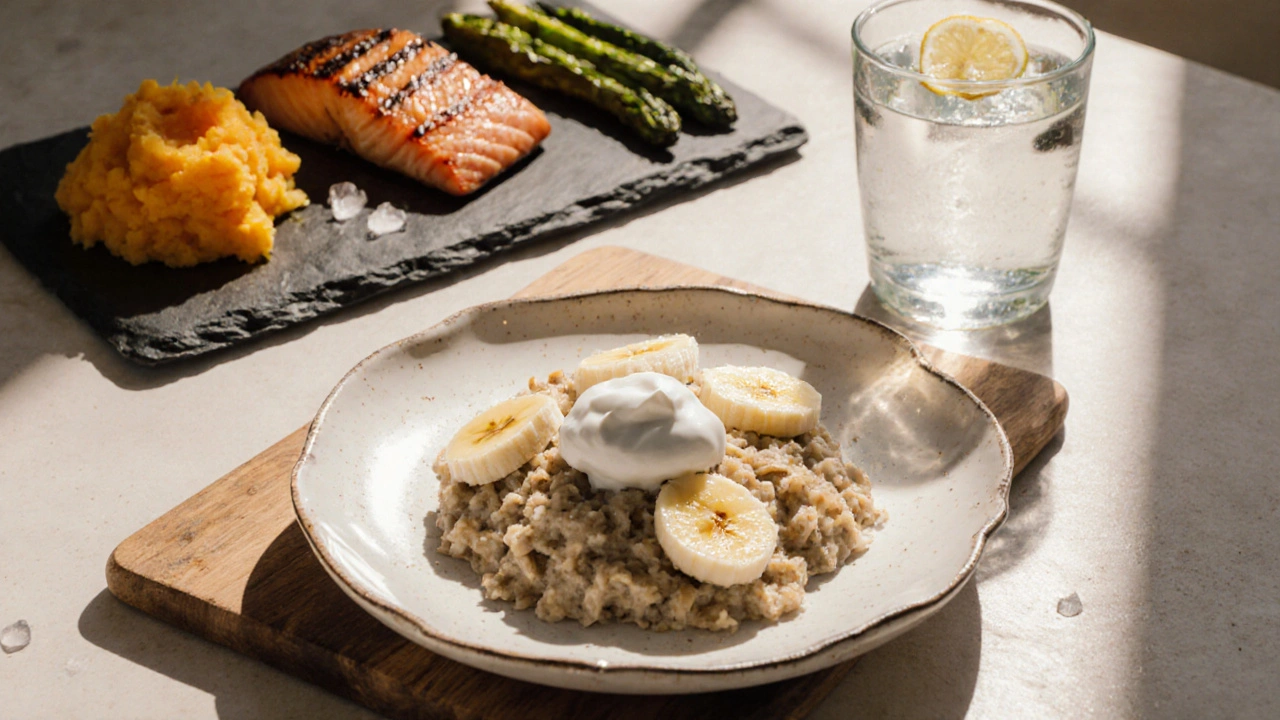Celiac Diarrhea Trigger Checker
Enter your symptoms and diet information above and click "Analyze Potential Triggers" to get personalized insights about possible causes of your diarrhea.
Quick Take
- Diarrhea is a common warning sign that gluten is slipping into your diet.
- Eliminate hidden gluten, stay hydrated, and restore gut balance with targeted foods.
- Track symptoms daily; small changes can reveal problem areas fast.
- Regular labs (iron, zinc, vitamin D) catch deficiencies before they cause more trouble.
- Work with a dietitian who knows celiac disease for a sustainable plan.
What Triggers Diarrhea in Celiac Disease?
When you have Celiac Diseasean autoimmune reaction to gluten that damages the small intestine, your body launches an attack the moment gluten reaches the small intestinethe part of the gut where most nutrient absorption occurs. The inflammation flattens the villi, so water and electrolytes aren’t absorbed properly, leading to loose stools.
Even a tiny grain of wheat hidden in a sauce can set off a flare‑up. That’s why diarrhea often feels like a sudden, unwelcome visitor after meals you thought were safe.
How Gluten Sensitivity Differs from Classic Celiac
Gluten Sensitivitya non‑autoimmune reaction that still causes gastrointestinal distress doesn’t damage the villi, but it can still provoke diarrhea, bloating, and fatigue. The key difference is that blood tests for antibodies (tTG‑IgA) are usually negative, and biopsy results look normal.
Because the symptoms overlap, many people with non‑celiac gluten sensitivity (NCGS) end up following a gluten‑free dieta dietary plan that excludes wheat, barley, and rye to see if they feel better.
Core Strategies to Keep Diarrhea at Bay
- Go 100% gluten‑free. Read every label, even for “flavored” or “seasoned” items. Look for the “gluten‑free” symbol, but also scan the ingredient list for hidden sources like maltodextrin, modified food starch, or hydrolyzed soy protein.
- Control cross‑contamination. Use separate cutting boards, toasters, and storage containers. In shared kitchens, wipe down surfaces, and avoid bulk bins unless you can guarantee they’re clean.
- Rehydrate wisely. Diarrhea flushes out sodium, potassium, and magnesium. Drink oral rehydration solutions (ORS) or mix a pinch of salt and sugar into water. Coconut water works too, but check the label for added sugars.
- Boost gut healing foods. Incorporate low‑FODMAP, high‑soluble‑fiber options such as peeled carrots, ripe bananas, and oats labeled gluten‑free. Probioticslive beneficial bacteria that can restore microbial balance like Lactobacillus rhamnosus GG have shown modest reductions in celiac‑related diarrhea in small trials.
- Watch micronutrients. Chronic diarrhea can deplete zinc and iron. Periodic blood work for zincan essential trace mineral for immune function and ferritin helps you catch deficiencies early. If low, a doctor may recommend supplements.
- Keep a symptom diary. Note the time, food, stress level, and stool consistency (use the Bristol Stool Chart). Patterns emerge quickly-maybe a particular spice or a restaurant’s “gluten‑free” pizza is the culprit.
- Schedule regular follow‑ups. Gastroenterologists check antibody levels and intestinal healing. If symptoms persist despite strict adherence, they may order a repeat endoscopy.

Sample Day of Gluten‑Free Eating to Calm Your Gut
| Meal | Food Choices | Why It Helps |
|---|---|---|
| Breakfast | Gluten‑free oatmeal topped with sliced banana and a spoonful of plain Greek yogurt | Soluble fiber slows transit; yogurt adds probiotic cultures. |
| Mid‑morning snack | Rice crackers with avocado mash | Low‑FODMAP, healthy fats coat the gut lining. |
| Lunch | Grilled chicken breast, quinoa salad (quinoa, cucumber, carrot, olive oil), and a side of steamed zucchini | Protein stabilizes blood sugar; quinoa is naturally gluten‑free and gentle on digestion. |
| Afternoon snack | Plain kefir (if tolerated) or a small handful of pumpkin seeds | Kefir provides additional probiotics; seeds give zinc. |
| Dinner | Baked salmon, sweet potato mash, and sautéed spinach with garlic‑infused oil | Omega‑3s reduce inflammation; sweet potato adds pectin (soluble fiber). |
| Evening beverage | Warm water with a pinch of sea salt and a splash of lemon | Replenishes electrolytes lost to diarrhea. |
When Diarrhea Signals a Bigger Issue
If loose stools last more than two weeks despite strict gluten avoidance, consider these possibilities:
- **Refractory celiac disease** - the immune system continues to attack even without gluten.
- **Secondary lactose intolerance** - damaged villi reduce lactase production.
- **Infection** - a gut pathogen can mimic celiac flare‑ups.
- **Medication side‑effects** - antibiotics, NSAIDs, or certain supplements may irritate the gut.
Discuss these with your doctor; they may request stool studies, repeat serology, or a short course of steroids for refractory cases.
Quick FAQ
Frequently Asked Questions
Can I eat oats if I have celiac disease?
Pure, uncontaminated oats are safe for most people with celiac, but they must be labeled gluten‑free to guarantee no cross‑contact. Start with a small portion and monitor your stool.
Why does my diarrhea improve after a few days on a gluten‑free diet?
As the gut lining begins to heal, villi regain height and start absorbing water again. This reduces the volume of stool and restores normal consistency.
Is a probiotic supplement necessary?
Not mandatory, but many patients report fewer urgent trips to the bathroom when they add a high‑quality, multi‑strain probiotic that includes Lactobacillus and Bifidobacterium.
How much fluid should I drink during a diarrhea flare?
Aim for at least 2-3 litres of fluid per day, mixing water with electrolytes (a pinch of salt + a teaspoon of sugar per litre) or using an ORS powder.
Can stress trigger diarrhea in celiac patients?
Yes. The gut‑brain axis means anxiety can speed up intestinal motility, worsening loose stools even when gluten intake is controlled.
Next Steps for a Smoother Gut
Start by auditing every pantry item for hidden gluten. Swap questionable products for certified alternatives, and keep a simple diary for at least a week. If diarrhea persists, book an appointment with a gastroenterologist and request a repeat celiac panel plus zinc/iron labs. Finally, consider a session with a registered dietitian who specializes in celiac disease; their customized plan can keep your symptoms in check without feeling like a culinary sacrifice.


Post A Comment